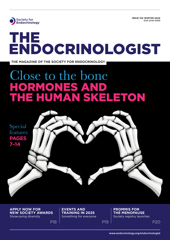The Society for Endocrinology has recognised a critical gap in menopause management and outcome data.
At a pivotal moment when increasing access to hormone replacement therapy (HRT) is enabling more women (particularly those with complex comorbidities) to seek treatment outside traditional clinical trials, we have launched our data registry: ‘patient-reported outcomes for menopause management intervention study’ (PROMMIS). This initiative will capture real-world data on menopause management, filling gaps in our understanding of treatment outcomes to positively shape the future of evidence-based care in women’s health.
Health inequalities relating to various aspects of menopause care are increasingly being highlighted and scrutinised.1–3 Many questions remain unanswered. While some modern HRT formulations may be safer than older regimens, there is a lack of clinical outcome data, particularly for high-risk women with complex health issues. The outcomes of HRT regimens that fall outside regulator-approved dosing schedules are unknown. From another angle, many women who are deemed unsuitable for HRT feel excluded from online and media discussions about menopause, and express frustration over the lack of effective alternatives for managing menopause symptoms. Moreover, there is a significant lack of data to guide menopause clinical management for those with adverse cardiometabolic health, gynaecological-endocrine problems, and oestrogen-related cancers.
Large-scale randomised trials using modern HRT formulations and unconventional regimens, especially in high-risk women, are unlikely to receive ethical approval or funding. Therefore, formally collecting real-world evidence through the Society’s new PROMMIS registry will provide one of the best opportunities to capture experiences and treatment outcomes related to menopause in modern cohorts of women.4
This registry is unashamedly patient-centric. The data collection process is innovative, utilising an online platform that can be accessed via a QR code, making it suitable for smartphone users (www.peoplewith.com). Relevant clinical data from primary care records will be obtained through automation, with options for additional input from secondary care providers.
Our new PROMMIS registry is ambitious and bold. It is a long term initiative supported by a steering group of leaders from endocrinology and allied specialties across the devolved nations, alongside collaborations with charities and patient groups. The Society will host the registry with funding support from unrestricted educational grants.
I am proud to be a member of an organisation with such a brilliant strategic vision. I look forward to seeing evidence emerging from this pivotal registry, which promises to shape future research and clinical practice in women’s health for decades. I hope you share my excitement.
ANNICE MUKHERJEE
Steering Group Chair, Sp. – PROMMIS
REFERENCES
1. Audet M et al. 2017 Sociology of Health & Illness https://doi.org/10.1111/1467-9566.12593.
2. Stuenkel CA 2017 Climacteric https://doi.org/10.1080/13697137.2016.1267723.
3. Harlow SD et al. 2022 Women’s Midlife Health https://doi.org/10.1186/s40695-022-00073-y.
4. Panay N et al. 2024 Climacteric https://doi.org/10.1080/13697137.2024.2394950.
Find out more about the PROMMIS registry.







